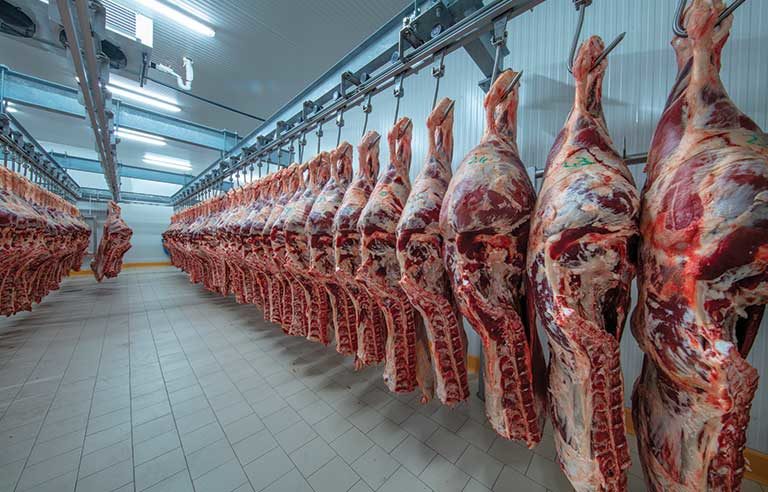Trump orders meatpacking plants to remain open amid COVID-19 pandemic

Washington — Two days after OSHA and the Centers for Disease Control and Prevention issued voluntary interim guidance aimed at preventing the spread of COVID-19 among workers in the meatpacking and poultry-processing industries, President Donald Trump invoked the Defense Production Act of 1950 and declared the facilities “critical infrastructure” in an Executive Order intended to keep meatpacking facilities open.
“We’re working very hard to make sure our food supply chain is sound and plentiful,” Trump said in an April 28 press release, which adds that employers in the industry are responsible for following the joint OSHA-CDC guidance. The guidance encourages employers to consider the following precautions to protect workers from exposure:
- Cleaning of shared meatpacking and processing tools
- Screening employees for COVID-19 before they enter work facilities
- Managing workers who have symptoms of COVID-19
- Providing appropriate personal protective equipment
- Practicing physical distancing
- Implementing appropriate engineering, administrative and work practice controls
Among the controls recommended by OSHA and CDC are installing physical barriers between workers, ensuring adequate ventilation, setting up additional clock-in/clock-out stations, staggering break times and providing temporary break areas, adding more handwashing and hand-sanitizer stations, and providing visual cues so workers can maintain proper physical distancing.
The National Council for Occupational Safety and Health is among the advocacy groups saying voluntary guidance is inadequate, claiming that at least 11 workers in the industry have died nationwide.
“To keep their doors open safely, meatpacking plants – and all essential workplaces – must operate under clear enforceable OSHA standards, not voluntary ‘guidance,’” Jessica Martinez, co-executive director of National COSH, said in an April 28 statement. “Safe operations must include a comprehensive assessment and control plan, developed with strong input from workers and their union.”
The United Food and Commercial Workers International Union, in an April 28 statement, claim that more than 5,300 of its members in essential workplaces have been impacted by COVID-19.
“The human cost to America’s food, retail and commercial workers is real and growing,” UFCW International President Marc Perrone said. “These workers never signed up to be first responders in an emergency, but that is exactly what they are now and they need protections immediately before more lives are needlessly lost.”
Acting OSHA administrator Loren Sweatt and Solicitor of Labor Kate O’Scannlain released a joint statement shortly after the Executive Order was issued, calling the guidance “vitally important” for employers to follow. They add that the agency will use “enforcement discretion” when considering employers’ adherence to the guidance or their “good faith” effort to do so.
Employers also do not have to implement portions of the guidance that they deem “not feasible” in their facilities, but are “encouraged to document why that is the case.” The statement also indicates the Department of Labor “will consider a request to participate” in litigation on behalf of employers it deems are acting in good faith who might be sued by an employee, and vice versa.
Iowa Gov. Kim Reynolds (R), who noted that her state produces 10% of the nation’s food supply, said during an April 28 press conference that meatpacking and processing plants are “essential, critical infrastructure. It is essential to keeping the food supply chain moving. We have a role and an obligation – from our farmers to our processors to our supply chain – to continue to feed the world. We have to figure out how we can do that in a responsible and safe manner.”
Post a comment to this article
Safety+Health welcomes comments that promote respectful dialogue. Please stay on topic. Comments that contain personal attacks, profanity or abusive language – or those aggressively promoting products or services – will be removed. We reserve the right to determine which comments violate our comment policy. (Anonymous comments are welcome; merely skip the “name” field in the comment box. An email address is required but will not be included with your comment.)

